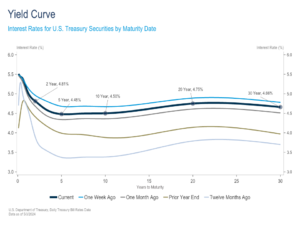Weekly Market Insights 05.06.24
Great News, Job Growth Slowed?
Financial Markets
At first glance, anyone would be forgiven for thinking our title was a mistake. But no, it is correct. This is because market participants are almost solely concerned about the Federal Reserve and interest rates. The equity markets rallied strongly after the Bureau of Labor Statistics released its job report on Friday with the news of weaker than expected job growth, drawing investors into the market. For the week, the Dow gained 1.14%, the S&P 500 gained 0.55%, while the NASDAQ gained 1.43%. Almost all the gains came on Friday, driven by hopes from investors that more subdued job growth will encourage the Federal Reserve to ease sooner rather than later.
The Economy
Some analysts believe slowing job growth may be an early sign of a weakening economy. One reason why is that most of the job creation came from more stable sectors like healthcare, government, and social assistance. But really, that is how it should be. As an economy begins to slow, private sector businesses more dependent on discretionary spending will respond far more quickly with reduced hiring. It is a matter of the profit motive pushing efficiency.
A point made by a Wall Street Journal editorial is that a large driver of the job growth was tied to the government spending boom.[1] That point is correct, but it is also by design. A lot of these programs were for long overdue public works that aren’t necessarily tied to the normal business cycle. The far more interesting part is that a very large amount of spending is going toward programs designed to bring industries back to the U.S. However, these types of investments take a long time to develop and haven’t had the time to sprout new jobs yet.
The health and strength of the labor market is so important to the United States economy. We and many others have written about the tremendous amount of spending by U.S. companies on new technologies and the benefits these investments may bring. Specifically, we will likely see large job creation but an equally large change in the composition of the jobs that need to be filled. The need will be for a highly educated, mobile work force. An unfortunate and unintended consequence will be that the less educated will be, through no fault of their own, left out. The country must be prepared to deal with this. It will likely entail the heavy use of automatic stabilizers and significant investment in education, an underappreciated national economic asset.
Conclusion
Boring as it might sound, things have not changed much. Economic signals are not telling us anything startling.
A quick word about the Fed—we believe the Federal Reserve is doing an excellent job. In the words of Rupert Kipling, “If you can keep your wits about you while all others are losing theirs, and blaming you…The world will be yours…” By this, we mean the Fed has moved slowly and deliberately, not being swayed by investors’ demands. We believe this is being done for the better.

Read pdf here.
[1] The Editorial Board. “The Government-Spending Jobs Boom.” Wall Street Journal, May 3, 2024. https://www.wsj.com/articles/government-jobs-healthcare-social-assistance-economy-investment-efe3a8e2?mod=editorials_article_pos6.